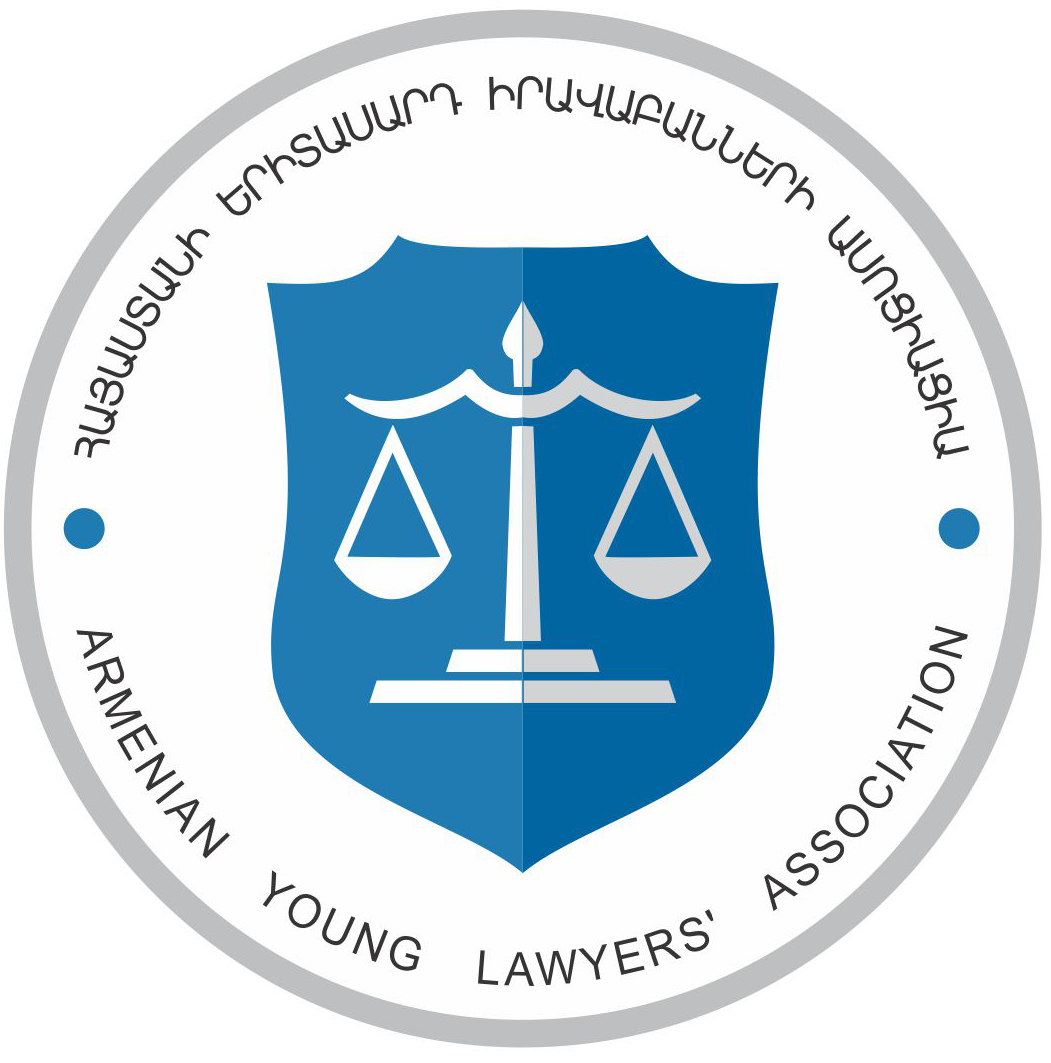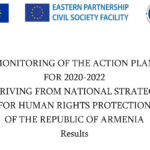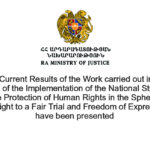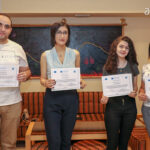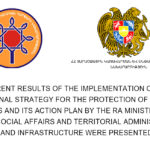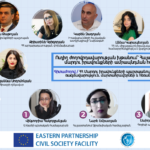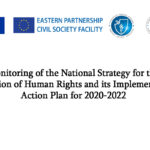Five Days about the European Law and the Protection of Human Rights. Summer School finished
A year later at the same place and in the same format the Summer School on European Law was launched. Five day about the European law and human rights’ protection. The organizers were the same: The Law Foundation of Armenia (LFA), the Armenian Young Lawyers Association NGO (AYLA) and the German Fund for International Legal Cooperation (IRZ).
“The main goal of the Summer School is to deeply examine during these 5 days the European Law, the European mechanisms of the protection of human rights, the activities of the European Court of Human Rights,” said Karen Zadoyan, the author of the idea of the Summer School on European Law, and the Head of the Board of Trusties of the Law Foundation of Armenia.
This year 73 persons applied for the summer school. According to the applied documents only 39 of them were selected for the oral round and 29 were selected to participate in the Summer School. Another 2 students were invited from the last year’s summer school participants.
“After the first Summer School the experts from Germany, the members of the Armenian Young Lawyers Association, as well as the participants were very satisfied with the results and we decided to continue the idea,” mentioned the project manager of IRZ, Franziska Simon.
“After so many reactions about the first Summer School on European Law, it was decided to make the Summer School traditional,” mentioned the coordinator of Armenian projects of IRZ, Nelli Tumasyan.
The first lecture started. The board member of AYLA, advocate, Marat Atovmayn is having a lecture. He is providing a lecture already for the second time as a local expert at the Summer School on European Law. Though the topic of the lecture is different this time but the enthusiasm of the participants is not less compared to the last year.
“This year I presented to the participants the cooperation of Armenia with international and especially European international organizations. The participants are quite active both this year and the last year and ask questions to the lecturers,” informed Marat Atovmyan.
Before getting acquainted with other lectures the young lawyers interested in European law, the bachelor, master and post-graduate students studying at the law departments of the universities in Armenia expressed their first impression; they have already examined the agenda.
“I am aware of the agenda; there are many interesting topics which will be touched upon in the framework of this Summer School. It is interesting that there are specialists from Germany. It would be interesting to listen to their opinions,” said the student of the Armenian-Russian (Slavonic) University, Narek Abgaryan.
“I deal with the European Convention on Human Rights during my daily activities and there are many violations of this convention. I think this is a good opportunity to develop my knowledge about European Convention and to become more professional,” mentioned advocate Gevorg Martirosyan.
“There is an impression that the schedule is quite overloaded, it is going to be very interesting. Definitely, I will get what I came for,” thinks lawyer, lecturer Ruzanna Azroyan.
“I expect an exchange of experiences with all the participants and the experts,” said Shahane Hakobyan, the alumni of the French University of Armenia and the student of the American University of Armenia.
“I decided to participate in order to get acquainted with the students that are dedicated to European values, who want to integrate European values in Armenia,” mentioned the alumni of YSU, Argishti Sargsyan.
Student, Hayk Ghazaryan and Armen Poghosyan are the alumni of the First Summer School on European Law. They were invited to participate this year and to share their experience with other participants.
“This year I would like the participants to be more active in discussions and to express their standpoints,” mentioned the student of State Pedagogic University of Armenia, Hayk Ghazaryan.
Hayk registered many changes in the agenda of the course compared to the last year. It is good that there are no repetitions of last year’s topics. Besides, last year the issues of the EU Association Agreement between the EU and Armenia were actively discussed, this year the picture is different. Official Yerevan is going to become a member of the Tax Union.
“As you know Russia was the military supporter of Armenia for long years and since we are the supporters of security, may be this will sound subjective, but Armenia needs the assistance of Russia, Tax Union, but from another perspective when we consider what the EU gives we are more inclined to think that Armenia has European future,” thinks the alumni of the French University of Armenia and the European Studies Center of YSU, Masters course on “Human Rights and democratization”, Lilit Sargsyan.
The institutional construction of the European Union: Miss Syuzanna Soghomonyan AYLA President advocate presented this topic . As a local expert already for the second year she teaches this topic in the Summer School on European Law. “Naturally, it is primary to learn about the history of the European law and the construction of the EU in order to learn the European Law deeply. I taught the construction of the European Law, the main institutions that operate in the framework of the EU and that ensure the natural flow of the EU.”
The first expert arrived from Germany presented to the participants the history of the formation of the EU, the formation of the European Law and the judicial system of the EU. According to her, as for Armenia but also for other countries the appliance with Europe is effective for economic development.
“If any country wants to become a member of the EU, there must be a desire and awareness that the country will have to give a part of its sovereignty to that supranational institution, to the European Union,” mentioned the lecturer of the second Summer School on European Law, Prof. Dr. Carmen Thiele, University Frankfurt Oder.
“First of all it would be better if the implementation of justice in the Republic of Armenia is complete and ensures the implementation of the principles of the European law. In other words, globally there is no legal norm and principle which we don’t have in domestic legislation but in comparison with the European law where the center of the law is the person and the protection of his/her main rights and freedoms, is the task of each country, in the RA we have the task of implementation,” mentioned the alumni of the law faculty of YSU, advocate, Ani Khlghatyan.
After the presentation of each topic the practical work started. The participants were divided into groups and started discussing the raised questions.
“First of all through practical work students get to know each other better, listen to each other’s ideas, secondly skills of team work are developed among the participants and finally, they deepen the acquired knowledge and skills,” mentioned the Assistant to the President of AYLA, the facilitator of the working group of the second Summer School on European Law, Nvard Loryan.
During 5 days the youth participants got not only theoretical knowledge and made practical work, but also participated in different sport events: excursion was organized to Haghartsin monastery. They talked to the priest, learned about the history of the monastery, presented their impressions about the summer school and returned to Aghveran singing and with high enthusiasm.
“I am very impressed and very interested since we combine both theoretical and practical knowledge, at the same time the organizers ensure our free time through different excursions,” said the alumni of Artsakh State University, YSU student, Varduhi Avanesyan.
The impressions of the second Summer School on European Law were positive. Many questions were directed to the experts, participants gained new friends.
“I am very impressed not only by the level of knowledge of the German experts but also that they are ready to give answers to all the questions,” said the alumni of the French University of Armenia, student of the American University in Armenia, Mariam Zadoyan.
“The lecture of Mr. Cosack was the most interesting for me since he talked about many practical issues: when talking about any law, provision he brought examples,” mentioned the alumni of the Northern University, the student of Shanghai University of Finance and Economics, Saren Abgaryan.
“Many important and actual issues were raised by my colleagues. To the questions of acting lawyers, professionals gave important answers in the practice,” mentioned the alumni of Gladzor University, Lilian Badiryan.
“First of all I would like to mention that the place for deepening and gaining knowledge is very effective, as well as it is important that the German experts shared their practical experience with us,” said the student of “Mants” University of Yerevan, Artur Makaryan.
“My impressions are very positive, I got everything that I expected from the summer school, found answers to all my questions. All the topics were well organized and developed,” said the student of the French University of Armenia, Anna Sardaryan.
How the construction of the European Court of Human Rights (ECHR) is, as well as the procedure of applying to court, how the application to ECHR must be narrated. The German experts gave complete answers to these questions sometimes even out of the schedule since the questions of the participants were too much.
“First, it is essential that the advocate is aware of the preconditions that are necessary for applying to ECHR and it would be better that the Chamber of Advocates organizes specific trainings for them. I would recommend to the advocates who intend to specialize in submitting claims to ECHR, to learn about the decisions already made by ECHR,” said Prof. Dr. Michaela Wittinger, Federal University of Applied Administrative Sciences Mannheim.
German advocate Michael Kleine-Cosack agreed with his colleague and adds another advice. From the first instance court it is necessary to advert to the articles of ECHR. It will contribute that in the decision making process of national courts the European Convention on Human Rights is also taken into account since the way to Strasbourg is very long.
“The matter is that the jurists are used to implement the right, that they use for their “Ordinary” work and they don’t refer to the European Convention on Human Rights. With the cases of my clients I always have to tell them to take into account the Convention,” mentioned Mr. Cosack.
The articles of ECHR, 5,6 and 10 raised discussions and questions. The Summer School comes to its end. The fifth day of the school is being summarized.
“We ask and encourage that you spread and use the gained knowledge inspired by European law, such European values like human rights, rule of law, freedom of speech and other important values in your activities,” said Karen Zadoyan in the closing ceremony of the school.
The awarding ceremony of the certificates to the participants successfully finished the Summer School begins. The participants leave Aghveran with new knowledge and impressions and the organizers promise to make the Summer School continuous and the work with the alumni of the school regular.
